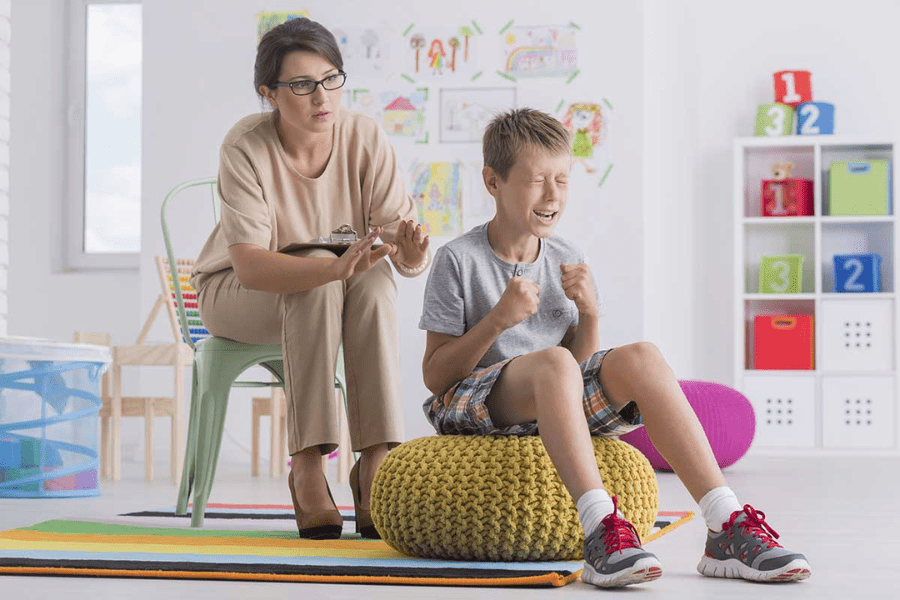
Source: innovationdistrict
An individual with Dyspraxia Learning Difficulties has motor synchronization, visual awareness and spatial consciousness difficulties which affect their capability to do coordinated actions. For example, a kid may not be able to grip a pencil properly which may be the reason of difficulties in writing.
Reading difficulties might result from visual perception. A learner is not able to differentiate between letters and numbers.
Spatial awareness problems might result in not understanding directions or judging distances, making activities like sports or movement in a classroom challenging.
Additionally, short-term working memory and organization of tasks and thoughts are affected, making it hard to follow multi-step instructions or plan out school projects. These challenges collectively make learning more difficult for children with Dyspraxia Learning Difficulties.
Do classes for Learning Disabilities include Dyspraxia?
Classes for Learning Disabilities often include specific support for Dyspraxia Learning Complications. At Vidhyanidhi Education Society (Govt. Regd.) our Learning Disability Course is prearranged to support children with Dyspraxia to effectively accomplish motor coordination, visual insight, and spatial consciousness. Our modified method safeguards that each kid receives the essential supervision and help to recover their learning experience.
The Vidhyanidhi Education Society’s (Govt. Regd.) LD Course for Dyspraxia Learning Difficulties includes:
Personalized Learning Plans
We generate personalized plans that provide to the exclusive requirement of each kid, aiming on areas where they need the most help.
Multi-Sensory Teaching Methods
Our methods incorporate visual, auditory, and kinesthetic learning styles to help children grasp concepts more effectively.
Skill Development
We focus on improving motor skills, coordination, and spatial awareness through targeted activities and exercises.
Memory and Organization
Strategies are taught to enhance short-term working memory and organizational skills, aiding in better task management.
Interactive Sessions
Engaging and interactive sessions that make learning enjoyable and effective.
Regular Assessments
Continuous assessments to monitor progress and adjust learning plans as needed.
Supportive Environment
A fostering atmosphere that motivates kids to learn at their own comfort and build self-confidence in their capabilities.
Our Learning Disabilities classes associate these approaches to enhance kids’ educational voyage who struggle with Dyspraxia.
Get in touch with us for Learning Disability Course, Call / Whatsapp on +919321024137 / +919869866277.
Click Here, to download the copy our Learning Disability Course brochure.

Source: theteacherstraining
According to DSM 5 Dyspraxia is?
Rendering to DSM 5, Dyspraxia is classified as a neurodevelopmental illness that disturbs motor synchronization. DSM 5 Dyspraxia, also known as Developmental Coordination Disorder (DCD), is specified by difficulty in performing motor tasks, which will affect daily activities and academic work.
DSM 5 Dyspraxia is defined by:
Motor Coordination Difficulties
Children with Dyspraxia exhibit noticeable clumsiness, difficulty with balance, and poor hand-eye coordination.
Impact on Daily Activities
The motor skill challenges interfere with daily self-care activities, such as dressing, eating, and writing.
Persistent Difficulties
These difficulties are not due to a general medical condition or intellectual disability but are persistent and interfere with age-appropriate tasks.
Onset in Early Developmental Period
Symptoms of Dyspraxia are evident from an early age, typically becoming noticeable when a child begins school and engages in structured physical activities.
Dyspraxia Learning Difficulties often become apparent in many ways, altering not only physical coordination but also cognitive and perceptual skills. Children with Dyspraxia may grapple with tasks that require back to back processing, such as following instructions with many procedures or sorting their thoughts and materials.
Understanding DSM 5 Dyspraxia is crucial for parents, teachers, and healthcare experts to provide proper support and interventions, confirming children with Dyspraxia Learning Difficulties can achieve their full potential.
Join VES’s Learning Disability Course and empower your child’s learning journey!
Get in touch with us for Learning Disability Course, Call / Whatsapp on +919321024137 / +919869866277.
Click Here, to download the copy our Learning Disability Course brochure.
Dyspraxia Learning Difficulties
FAQs
Does Dyspraxia qualify for Disability?
Educational and medical practices recognize Dyspraxia, also known as Developmental Coordination Disorder as a disability.
What is the new name for Dyspraxia?
Developmental Coordination Disorder (DCD), as accepted by the Diagnostic and Statistical Manual of Mental Disorders, Fifth Edition (DSM-5) is the new name for Dyspraxia.
Is Dyspraxia life long?
Yes, Dyspraxia is a lifelong situation. While this disorder can improve with mediation and practice, a person may continue to face problems with coordination and motor skills all through their lives.



